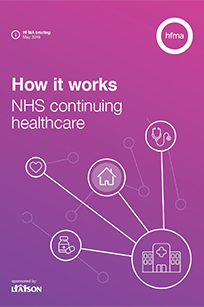Technical review – June 2019
NHS England and NHS Improvement has released summarised data from the 2017/18 voluntary submission of patient-level cost data. There are separate reports for: acute (81 submissions); mental health (18 submissions); and ambulance services (seven submissions). The acute report, an Excel spreadsheet, shows the average cost per episode for different healthcare resource groups, filterable by point of delivery and specialty, and also covers outpatients. The mental health report shows average cost per cluster day and per contact. The ambulance report shows unit costs for different ambulance currencies (hear and treat or refer; see and treat or refer; see and treat and convey; and other).

A new 'how it works' guide from the HFMA looks at NHS continuing healthcare (CHC), providing an overview of the rules and process and explaining commonly used terms. It also covers the new requirement for personal health budgets as the default option for CHC supporting people living in their own homes. The briefing is intended to provide a basic understanding for those working in NHS finance teams and provides links to further reading and guidance.
NHS England and NHS Improvement has updated technical information and definitions of maternity services in its non-mandatory prices workbook – part of its national tariff guidance for 2019/20. It had been identified that maternity pathway prices covered some public health services, which cannot be subject to national prices. New non-mandatory prices are now provided, known as benchmark prices, and are intended to be a starting point for local price-setting discussions.
The demands on costing teams to support patient-level costing and the use of the data by service teams to inform decision making are significant. A new case study from the HFMA Healthcare Costing for Value Institute describes how Stockport NHS Foundation Trust expanded the reach of its costing team by formally engaging the wider finance function. It did this by providing training and setting patient-level cost objectives for the management accounting team at all levels.
The Department of Health and Social Care has published the Group accounting manual 2019/20. The manual includes mandatory annual reports and accounts guidelines for clinical commissioning groups, NHS trusts and foundation trusts and arm’s length bodies. It lists six key changes from the 2018/19 manual, including amendments to remuneration reporting guidance; incorporation of text for IFRS16 deferral; and clarification where there is uncertainty over income tax treatments under IAS12.
NHS England and NHS Improvement has published web pages summarising progress towards new payment systems to support integrated care. The NHS long-term plan sets an ambition for the whole of England to be covered by integrated care systems by April 2021. These may be supported by population-based funding approaches, supporting the redesign of care across providers and moves to more preventative care models. An integrated care provider contract is also being developed enabling a single integrated organisation to take contractual responsibility for providing services to a defined population paid for by commissioners using a pooled whole population budget. The pages also signpost resources on blended payment approaches and risk sharing.
Related content
The Institute’s annual costing conference provides the NHS with the latest developments and guidance in NHS costing.
The value masterclass shares examples of organisations and systems that have pursued a value-driven approach and the results they have achieved.